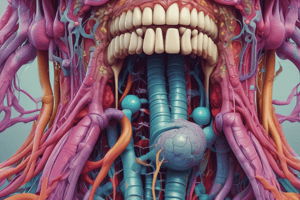Podcast
Questions and Answers
Match the following definitions with the correct term:
Match the following definitions with the correct term:
A distinct structural unit made up of different types of tissue = Organ Living matter of any one particular type, both structural and functional, composed of more or less uniformed cells = Tissue A unit from which living matter is built up, consists of protoplasm and nucleus = Cell Watery fluid percolating through all the minute spaces among the cells of the body = Tissue fluid
Match the following processes with their descriptions:
Match the following processes with their descriptions:
Nutrients diffuse out of capillary blood vessels into this fluid from which they are absorbed by the cells = Tissue fluid Waste products are transferred from the cells via the tissue fluid to the blood and lymph = Tissue fluid Dissolved substances diffuse from zones of high concentration to zones of low concentration = Diffusion If the blood ceases to flow, the concentrations become balanced and diffusion stops = Diffusion
Match the following cell types with their origin:
Match the following cell types with their origin:
Ectoderm = Primitive cell type Mesoderm = Primitive cell type Endoderm = Primitive cell type Derived from three primitive cell types: ectoderm, mesoderm, and endoderm = All tissues of the body
Match the following types of tissues with their descriptions:
Match the following types of tissues with their descriptions:
Match the following tissue components with their roles:
Match the following tissue components with their roles:
Match the following categories with the types of tissues they comprise:
Match the following categories with the types of tissues they comprise:
Match the following organs with their tissue composition:
Match the following organs with their tissue composition:
Match the following structures with their descriptions:
Match the following structures with their descriptions:
Match the following types of cells with their descriptions:
Match the following types of cells with their descriptions:
Match the following tissues with their types:
Match the following tissues with their types:
Match the following categories with their components:
Match the following categories with their components:
Match the following organs with their tissue composition:
Match the following organs with their tissue composition:
Match the following statements with the correct tissue component:
Match the following statements with the correct tissue component:
Match the following body parts with their classification into systems:
Match the following body parts with their classification into systems:
Match the following structural units with their composition:
Match the following structural units with their composition:
Match the following fluids with their functions:
Match the following fluids with their functions:
Match the following processes with their outcomes:
Match the following processes with their outcomes:
Match the following primitive cell types with their derived tissues:
Match the following primitive cell types with their derived tissues:
Match the following components with their role in cell survival:
Match the following components with their role in cell survival:
Flashcards are hidden until you start studying




